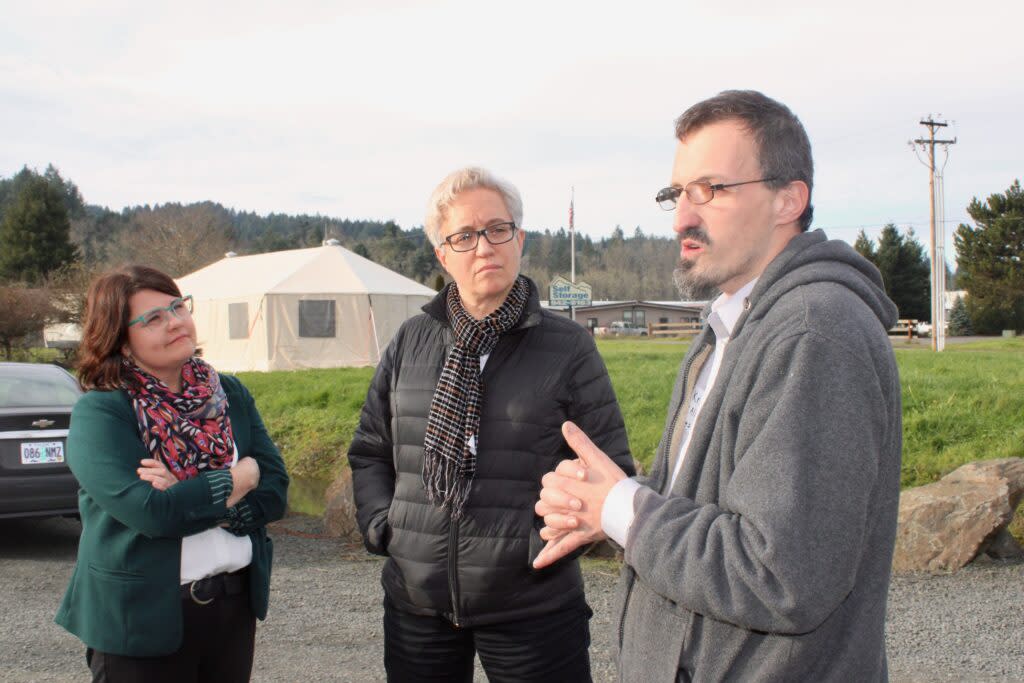Oregon needs official description of first spouse’s job

- Oops!Something went wrong.Please try again later.
- Oops!Something went wrong.Please try again later.
First lady Aimee Kotek Wilson, left, and Gov. Tina Kotek listen to Kris McAlister, executive director of the homelessness nonprofit Carry It Forward, in Cottage Grove on Dec. 14, 2023. (Julia Shumway/Oregon Capital Chronicle)
For her own sake as well as the state’s, Gov.Tina Kotek ought to propose the Legislature write into state law rules governing what a governor’s spouse can and must not do.
She could even write the policy as a temporary executive order until the Legislature acts –and pledge to abide by its terms.
She seemed to indicate the need for some structure when on April 3 she asked for guidance from the Oregon Government Ethics Commission. That may yield some useful advice, but it’s likely to be thin since Oregon law and rule barely touch the subject.
Headlines in the last couple of months of turmoil in Kotek’s office, including on Friday, are enough of a warning that guard rails are needed on the role of the first spouse. The experience of her predecessor once removed, John Kitzhaber, different though in key ways, also made that plain.
We give governors leeway in deciding who their advisors will be, and spouses sometimes have a role. It can often be unofficial, but spousal involvement can become uncomfortable, disconcerting and disruptive for staff at times, even when the top executive makes a serious effort to avoid problems. A spouse active in policymaking often can easily outmaneuver even experienced and highly capable staff, including people who may have more valuable expertise.
The same often goes for political campaigns. Political campaign managers who have uneasy relationships with candidate spouses can throw campaigns off balance.
These situations tend to be more the exception than the rule, however. Many spouses, even in the families of many presidents, have little interest in government or elective office and stay clear of them. In a recent collection of Oregon officials’ comments on the subject assembled by Willamette Week, U.S. Sen. Ron Wyden noted that his wife operates her own business and spends much of her time working on it. The other senator, Jeff Merkley, indicated that while he and his wife often talk about Senate business, she keeps her involvement away from the office.
The spouse story isn’t always negative. State Sen. James Manning of Eugene, now a candidate for secretary of state, recalled that, “When my wife was here – she passed away almost three years ago – she served as my chief of staff in the Senate. I conferred with her all the time. People would stop by to see her and not me.”
In the case of two other recent governors, Kate Brown and Ted Kulongoski, first spouses were active in limited areas – a few environmental and cultural projects, respectively – but not as central actors in the office.
But personnel and budget considerations, among other things, make the meshing of family roles and executive office management a complex subject. The case of Kitzhaber and his fiancée make for a standing red flag and a marker of how those relationships can destroy a governorship that in many other respects would have been considered sound.
That case involved Kitzhaber’s partner, Cylvia Hayes, who, many news reports said, used not only her position as first lady but also state resources and personnel to build her consulting business while maintaining an occasional role in the governor’s office.The combination of those factors, and Kitzhaber’s defense of her, eventually led to both federal and state investigations (though no criminal charges) and the governor’s resignation.
That offers a clear rule: Do not mix state activity with outside interests, especially any of a financial or personally beneficial nature.
The Kotek case differs in that, to this point, no outside involvement or personal enrichment is alleged. At the same time, Aimee Kotek Wilson is clearly more involved in the office. She isn’t paid and doesn’t hold an official state title. But the departure of three senior staffers in the governor’s office has been linked in news reports to Kotek Wilson’s role in the office. And news surfaced last week that her communications director is also leaving.
Is there a way to structure first spouse involvement to minimize those issues while taking advantage of the assets that can bring?
Other states offer limited guidance. Most have no official or formal role at all for the first spouse, even when, as in Florida, North Dakota and elsewhere, they are independently active on issues.
A few provide formal organizational structures.
The California governor’s office publishes an office organization chart, and one side of it falls under the “first partner.” The organization under her includes six state staffers. At least two other states, Pennsylvania and Georgia, list chiefs of staff for first spouses on their websites. Washington state may have something generally similar, on a smaller scale, with one state employee detailed to help with the first lady’s schedule.
Those states all are larger than Oregon, and if Kotek tries to launch a full-scale office for the first spouse, there’ll be blowback – and it could be fierce. A small amount of support from a staffer or two might be more supportable.
What’s more clearly needed is a set of rules around the authority and role a first spouse might assume without becoming a state employee. Given the recent rush of headlines, Kotek might be wise to address that soon.
GET THE MORNING HEADLINES DELIVERED TO YOUR INBOX
The post Oregon needs official description of first spouse’s job appeared first on Oregon Capital Chronicle.

